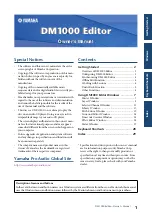
Amigopod 3.7
| Deployment Guide
Reference |
395
Any other alphanumeric characters in the picture string will be used in the resulting username or password.
Some examples of the picture string are shown below:
Form Field Validation Functions
See
“Form Validation Properties”
in this chapter and
“Examples of Form field Validation”
in the
Guest Management chapter for details about using validation functions for form fields.
The built-in validator functions are:
IsArrayKey
– Checks that the value is one of the keys in the array supplied as the argument to the
validator.
IsArrayValue
– Checks that the value is one of the values in the array supplied as the argument to the
validator.
IsEqual
– Checks that the value is equal to the value supplied as the argument to the validator, allowing
for standard type conversion rules.
IsGreaterThan
– Checks that the value is strictly greater than a specified minimum value supplied as
the argument to the validator.
IsIdentical
– Checks that the value is equal to the value supplied as the argument to the validator, and
has the same type.
IsInRange
– Checks that the value is in a specified range between a minimum and maximum value. The
minimum and maximum values are specified as a 2-element array as the argument to the validator.
IsInOptionsList
—Checks against a list of options in the policy definition.
IsNonEmpty
– Checks that the value is a non-empty string (length non-zero and not all whitespace), or
a non-empty array.
IsNonNegative
– Checks that the value is numeric and non-negative.
IsRegexMatch
– Checks that the value matches a regular expression supplied as the argument the
validator. The regular expression should be a Perl-compatible regular expression with delimiters. For
example, the validator argument
/^a/i
will match any value that starts with an “a”, case-insensitively.
See
“Regular Expressions”
in this chapter for more information about regular expression syntax.
IsValidBool
– Checks that the value is a standard Boolean truth value. Valid Boolean values are the
integers
0
and
1
and the PHP values
false
and
true
.
IsValidDateTime
– Checks that the value appears to be a valid time specification string according to
the rules of the PHP function
strtotime()
. Valid date/time syntax includes ISO 8601 standard times
(
YYYY-MM-DD hh:mm:ss
) with and without time zone specifications, as well as many other formats.
IsValidEmail
– Checks that the value appears to be a valid
RFC 822-
compliant email address. When
using the IsValidEmail validator, the validator argument may be specified wieth a whitelist/blacklist of
domain names. Use the syntax:
array(
'allow' => array(
Table 42
Picture String Example Passwords
Picture String
Sample Password
####
3728
user####
user3728
v^^#__
vQU3nj
@@@@@
Bh7Pm
Summary of Contents for Amigopod 3.7
Page 1: ...Amigopod 3 7 Deployment Guide...
Page 14: ...14 Amigopod 3 7 Deployment Guide...
Page 30: ...30 Management Overview Amigopod 3 7 Deployment Guide...
Page 108: ...108 RADIUS Services Amigopod 3 7 Deployment Guide...
Page 132: ...132 Operator Logins Amigopod 3 7 Deployment Guide...
Page 240: ...240 Guest Management Amigopod 3 7 Deployment Guide...
Page 332: ...332 Administrator Tasks Amigopod 3 7 Deployment Guide...
Page 336: ...336 Administrator Tasks Amigopod 3 7 Deployment Guide...
Page 345: ...Amigopod 3 7 Deployment Guide Hotspot Manager 345...
Page 362: ...362 High Availability Services Amigopod 3 7 Deployment Guide...
















































